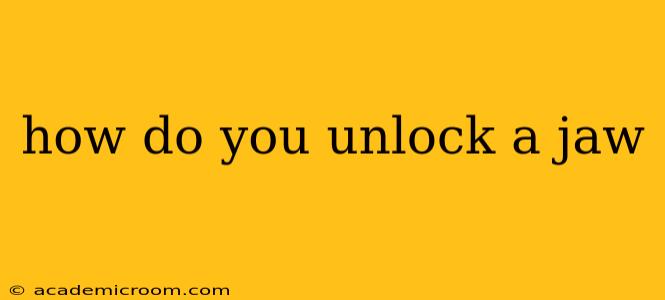How Do You Unlock a Jaw? Understanding Temporomandibular Joint (TMJ) Dysfunction
The phrase "unlock a jaw" usually refers to experiencing temporomandibular joint (TMJ) dysfunction, often characterized by a jaw that feels locked, stiff, or painful. It's crucial to understand that actually "unlocking" a jaw isn't a simple process like opening a door. It requires careful consideration and, in many cases, professional medical attention. This article will explore the potential causes of jaw locking and the various ways to address this issue.
What Causes a Jaw to Feel Locked?
Several factors can contribute to the sensation of a locked jaw. These often relate to the complex mechanics of the temporomandibular joint (TMJ), the joint connecting your jawbone to your skull.
-
TMJ Disorders: This is the most common cause. TMJ disorders encompass a range of conditions affecting the joint, including inflammation, disc displacement, and arthritis. These disorders can lead to pain, limited range of motion, and the feeling of a locked jaw.
-
Muscle Spasms: The muscles surrounding the TMJ can become tense or spasm, restricting jaw movement and causing a locking sensation. Stress, clenching, or grinding teeth (bruxism) are frequent contributors to muscle spasms.
-
Trauma: A blow to the jaw or a facial injury can damage the TMJ, leading to locking or limited movement.
-
Arthritis: Degenerative joint diseases like osteoarthritis or rheumatoid arthritis can affect the TMJ, causing inflammation, pain, and restricted movement.
How Can I Unlock My Jaw?
Addressing a locked jaw requires a multifaceted approach, and self-treatment should only be attempted after consultation with a healthcare professional. Improper self-treatment can worsen the condition.
Gentle Self-Care Techniques (Consult your doctor before trying these):
-
Heat/Cold Therapy: Applying a warm compress or ice pack to the affected area can help relieve pain and muscle spasms. Alternate between warm and cold compresses for optimal results.
-
Gentle Stretching: Certain gentle jaw stretches can help improve mobility, but it's crucial to do these very carefully and only after consulting your doctor or physical therapist. Avoid forceful movements.
-
Over-the-Counter Pain Relief: Nonsteroidal anti-inflammatory drugs (NSAIDs) like ibuprofen can help reduce pain and inflammation. Always follow dosage instructions.
What if My Jaw Remains Locked?
If your jaw remains locked or the pain is severe, seek immediate medical attention. A healthcare professional can accurately diagnose the underlying cause and recommend appropriate treatment.
What are the Treatment Options for a Locked Jaw?
Depending on the cause and severity of the jaw locking, various treatment options are available:
-
Medication: Pain relievers, muscle relaxants, and anti-inflammatory medications may be prescribed.
-
Physical Therapy: A physical therapist can teach you exercises and stretches to improve jaw mobility and strengthen supporting muscles.
-
Splints or Mouthguards: These devices can help realign the jaw and protect the TMJ from further damage.
-
Injections: Corticosteroid injections can help reduce inflammation in the joint.
-
Surgery: In rare cases, surgery may be necessary to correct severe TMJ disorders or injuries.
How Can I Prevent a Locked Jaw?
Preventing jaw locking often involves managing contributing factors:
-
Manage Stress: Practice stress-reduction techniques like yoga, meditation, or deep breathing exercises.
-
Improve Posture: Maintain good posture to reduce strain on the jaw muscles.
-
Avoid Clenching or Grinding Teeth: If you clench or grind your teeth, consider using a mouthguard.
-
Eat Soft Foods: While your jaw is stiff, opt for softer foods that require less chewing force.
Can a Chiropractor Help with a Locked Jaw?
Some chiropractors offer TMJ treatment, but it's crucial to choose a chiropractor with experience in this area. Always discuss this with your primary care physician or a specialist before seeking chiropractic care for TMJ disorders.
Remember, this information is for general knowledge and does not constitute medical advice. If you are experiencing a locked jaw or TMJ dysfunction, consulting a healthcare professional for a proper diagnosis and treatment plan is crucial. They can assess your individual situation and determine the best course of action.
